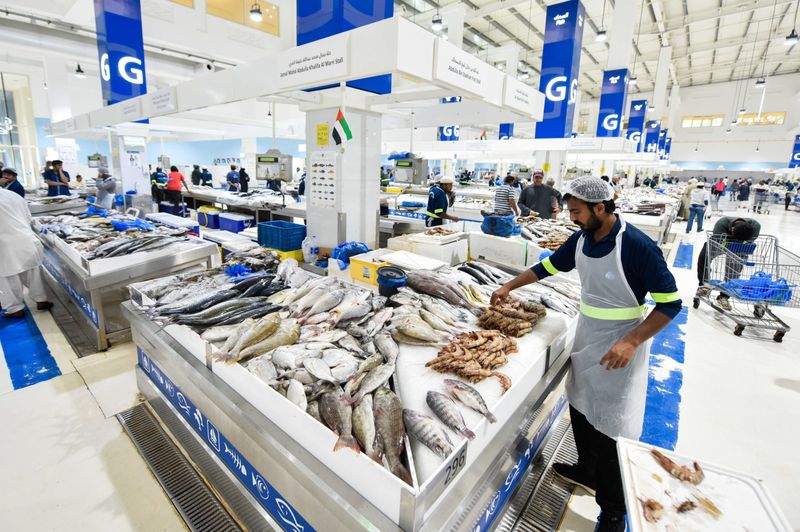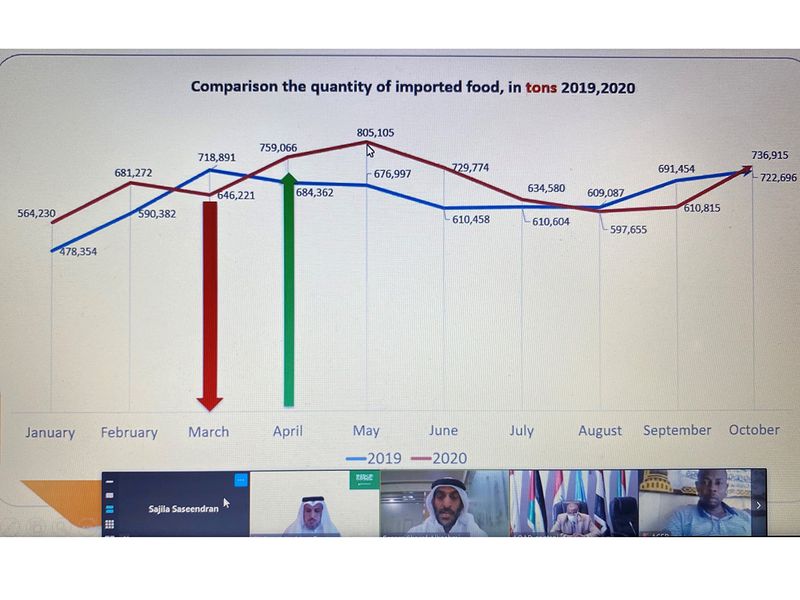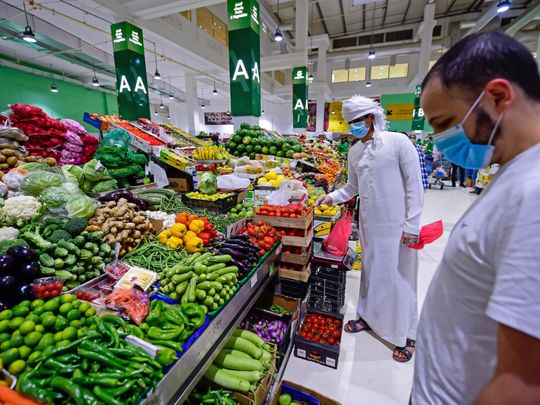Dubai: When millions of people faced issues with food supplies in different parts of the world due to lockdowns and travel restrictions over the COVID-19 pandemic, Dubai ensured there was no dearth of safe and nutritious food for consumers at all levels. With more than 90 per cent of the food imported into Dubai, it was no easy task for the Food Safety Department under Dubai Municipality.
However, the authorities managed to keep food supply steady by taking various proactive measures. In fact, following a lull immediately after flights were suspended, the quantity of food imported to Dubai increased compared to the same period in 2019.
Global food industry experts heard Dubai’s success story during the pandemic at the 14th Dubai International Food Safety Conference held virtually under the theme ‘building resilient and sustainable food systems’.
Officials from the Food Safety Department explained the comprehensive mechanisms adopted to mitigate the impact of COVID-19 on the food supply chain during different sessions at the two-day conference that concluded on Monday.
During his presentation, Sultan Ali Al Taher, head of Food Inspection Section, said the department learnt from the experiences and mistakes of other countries and quickly set its priorities very early before lockdowns and movement restrictions started. “Our priority was to ensure that the food supply stayed uninterrupted with steady imports, manufacturing and distribution,” Al Taher said.
Ensuring protection
Protecting food handlers, consumers and frontline staff topped the action plans. “We had to do our best to ensure the protection of the people who work in the food industry, the consumers as well as the frontline staff, our inspection team. They had to continue their work without interruption,” said Al Taher.
The measures taken included providing personal protective equipment for inspectors, publishing an interim guide for the Food Safety Department and updating it periodically and introducing a specialised inspection mechanism for the prevention requirements as part of employees’ training.
Al Taher said the food poisoning investigation team was looking after the cases and providing solutions. It was working with establishments to close down affected premises to avoid the spread of disease. Meanwhile, online delivery was promoted to make shopping safe for customers.
Ensuring productivity
The department also had to ensure that inspection staff were productive as there was a high demand for food as people bought food items in bulk and stocked them up at home. “Our inspectors were working beyond their working hours to ensure that people got safe food and everything was okay.”
The department quickly developed guidelines and best practises for the industry. “We followed information that was scientifically correct, immediately issued regulations for social distancing, reducing crowding, hand hygiene and use of masks.”
A rapid response team was also set up to investigate food businesses with COVID-19 cases and ensure that proper isolation and quarantine measures were in place. Amid the surge of an “infodemic”, the department used different forms of communication to stay connected with the industry and to ensure the community received the right messages.
Cutting costs, easing rules
Food industry professionals had to be trained on hand hygiene for COVID-19 in a very limited time and the new normal was set very quickly. “We had to find the budget to carry out the new processes and practises, mobilise resources, protective gears etc. And for this, we had to cut other expenses so that we could spend on proactive measures.”
“We did many things to ensure trade was not affected. Fees were reduced and waived in some cases. We ensured products were released immediately from the ports, particularly when some products had some minor labelling issues or missing translation labels,” said Al Taher.
Inspections and training
Al Taher further said: “Online tools and computer technology were used to help staff work remotely. We held regular meetings with Dubai’s committee [Supreme Committee of Crisis and Disaster Management] to ensure safety in food businesses,” said Al Taher. “We educated the industry using online tools to ensure that consumers were not worried about safety,” Al Taher added.
How much of food was imported
In another presentation, Sayed Essam Sharaf Al Hashmi, head of Food Trade Control Section, explained that the quantity of food imported to Dubai saw a dip in March. However, it soon shot up in the coming months to more than what was imported during the same period in 2019. According to the figures he presented, Dubai had imported 718,891 tonnes of food in March 2019. Due to the impact of the pandemic, this dropped to 646,221 tonnes in March 2020. However, the quantity of imported food consignments started rising thereafter. The figures showed as many as 759,006 tonnes of food items were imported in April and 805,105 tonnes in May.
Ironically, however, the number of imported food consignments showed a different trend. Al Hashmi explained that the number of shipments, especially via airports, had decreased because of the lockdowns. However, an increase in the quantity of imported food was reported as a result of authorities encouraging food traders to import food as per the maximum capacity of each shipment.
Innovative testing methods
Around 80 per cent of the food items for the country are imported through Dubai from more than 170 countries. A major challenge that the authorities found in releasing imported food quickly during the pandemic was in food sampling and testing, according to Khalid Mohammed Sharif Al Awadhi, CEO of Dubai Municipality’s Health, Safety and Environment Sector. Speaking to Gulf News on the sidelines of the conference, Al Awadhi said the municipality’s new inspection system, “Qoot”, helped the authorities in tackling this challenge.
“According to our requirement, we need certification from the countries of origin that shows the food is safe. Since labs were closed in many countries, it was a challenge, mainly in the case of perishable and high-risk food.”

Image Credit: Ahmed Ramzan/Gulf News Archives
He said the implementation of Quoot — a system to ensure all food coming through the ports retain their quality until they reach the consumers — helped in meeting the challenge.
“Inspectors were able to identify and test food based on a risk-based approach. They could be as specific as possible in testing so that food consignments were released without delay and ensured compliance with food standards. We used rapid-testing methods and increased access to quick testing through mobile laboratory.”

Free meal distributions
Al Taher said the department also played a major role in distribution of food to the needy through the UAE Food Bank during Ramadan. “Our teams helped distribute 2.8 million meals with cooperation from food businesses during that period,” he said. It was done as part of the ‘10 million meals’ campaign, the UAE’s biggest community campaign that was held during the peak of the pandemic.
The department has also been working in collaboration with various other government entities to ensure comprehensive safety in food industry during the pandemic, Al Taher said, adding that constant communication with all government authorities has been an essential step to ensure the emirate tides over this unprecedented crisis.

